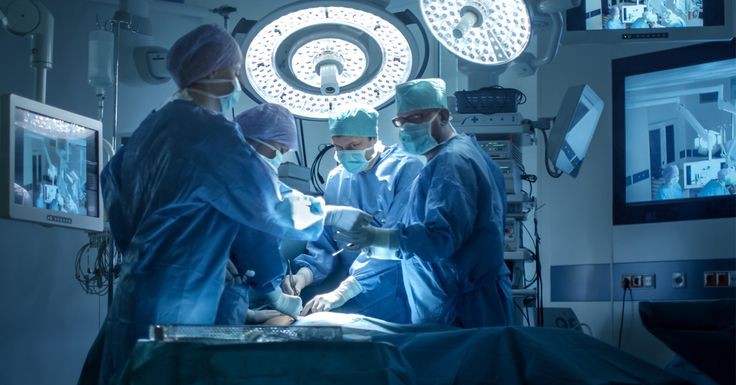CENTER FOR LAPAROSCOPIC SURGERY / MINIMALLY INVASIVE GI SURGERY
Laparoscopic surgery / Minimally Invasive GI surgery allows surgeons to operate with smaller
incisions. Some even operate with the help of tiny video cameras during surgery.
With minimally invasive surgery, patients will have less pain, less blood loss and smaller scars
after surgery. It also helps to lower the risk of infection. Patients often feel better quicker and
can leave the hospital sooner. Although there are many benefits, it is not an option for all
patients.
Listed below are some types of laparoscopic procedures that are done to treat GI conditions:
Adrenalectomy - This procedure removes growths in the adrenal glands. The adrenal glands are
found on top of the kidneys and make hormones that are needed to help the body work properly.
Appendectomy - This procedure removes an infected appendix (the small finger-like pouch at
the end of the large intestine).
Bariatric Surgery - This procedure makes the stomach smaller, which helps with weight
loss.
Cholecystectomy - This procedure treats gallstones by removing the gallbladder. It has few
risks to it and recovery time is usually short.
Colon and Rectal Surgery - This type of surgery treats conditions of the large intestine
(including the colon, rectum and anus).
Foregut Surgery - This is often used to treat conditions of the upper GI tract. It can
involve the esophagus (the tube connecting your mouth to your stomach), stomach or the upper portion
of the small intestines.
Hiatal Hernia Repair - This treatment can fix hiatal hernias and paraesophageal hernias. A
hiatal hernia is an opening in the diaphragm (the muscle that separates your chest from your
abdomen) that might cause the stomach or other abdominal organs to shift up into the chest. It can
cause heartburn, chest or abdominal discomfort, discomfort with eating or shortness of breath.
Nissen - This surgery is used to treat patients with severe gastroesophageal reflux disease
(GERD), also known as gastric reflux. It strengthens the muscle that contracts to keep stomach acid
away from the esophagus. People who suffer from chronic acid reflux often report feeling a burning
sensation in their chests, throats or mouths. Others may experience chest pain, difficulty
swallowing or a sore throat.
Pancreatic Surgery - Depending on the circumstances, this procedure can sometimes be used in
treating different pancreatic conditions.
Retroperitoneum Surgery - This procedure is often used for treatment of testicular
cancer.
Splenectomy - This type of procedure involves removing the spleen.
Open GI Surgical Procedures
Whenever possible, Penn Medicine performs minimally invasive surgical procedures. However, in some
cases, traditional open surgery is necessary.
Traditional open surgical procedures include:
Abdominal Surgery - Our doctors perform a variety of different abdominal surgeries.
Adrenalectomy - This surgery removes one or both adrenal glands. The adrenal glands are found
on top of the kidneys and make hormones that are needed to help the body work properly.
Appendectomy - This is a common emergency surgery to remove the appendix.
Nissen fundoplication - This procedure strengthens the muscle in between the stomach and
esophagus tube. It is used to treat patients with severe acid reflux or gastroesophageal reflux
disease (GERD).
Whipple Procedure (Pancreaticoduodenectomy) - This is a complex surgery commonly used to
treat cancer or other growths in or on the pancreas.
This minimal access surgery helps in early recovery of patients as they are usually walking around
in a few hours after the surgery and can resume their daily activities in no time. Laparoscopic
surgery causes minimal pain and has excellent cosmetic results. When compared to traditional open
surgery, in laparoscopic or minimal access surgery patients experience less pain, less scarring and
have a shorter recovery time. Minimal access surgery can successfully treat thyroid and parathyroid,
hernia, appendix, anorectal conditions, diseases of gastrointestinal tract, gall bladder stones and
certain clinical conditions involving pancreas, adrenal glands, spleen, kidneys and the liver.
Benefits of Minimal Access Surgery
- Quick recovery time
- Small Incisions
- Less discomfort
- Shorter hospital stays
- Less internal scarring
Dr. Nikhil Chopra (Surgical Gastroenterologist)
MBBS, MS (General Surgery), MCH (Surgical Gastroenterology)
